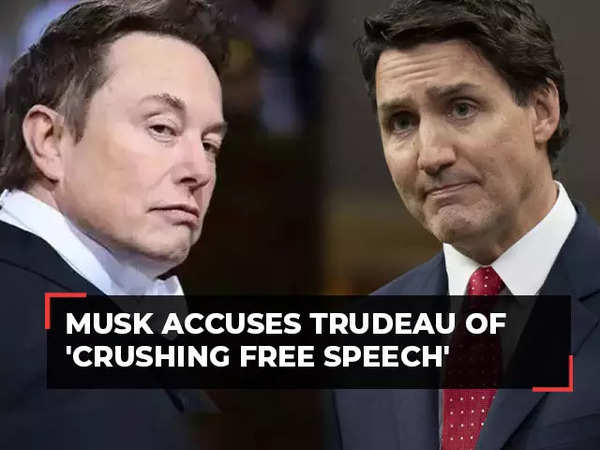Elon Musk Accuses Canadian PM Justin Trudeau of Threatening Free Speech

Elon Musk Accuses Canadian PM Justin Trudeau of Threatening Free Speech
In a fiery social media exchange that sent shockwaves through the tech and political spheres, Elon Musk, the world’s wealthiest individual and CEO of companies like Tesla and SpaceX, recently took aim at Canadian Prime Minister Justin Trudeau, accusing him of attempting to stifle free speech in Canada. Musk’s comments came in response to a journalist’s tweet about a new Canadian policy requiring online streaming services offering podcasts to register with the government, a move that has sparked a contentious debate on the balance between regulation and free expression in the digital age.
The Twitter storm began when a journalist tweeted about Canada’s decision to mandate that “online streaming services that offer podcasts” must formally register with the government. This registration requirement is intended to facilitate regulatory controls and oversight over digital content. While the government frames this as a measure to ensure the responsible distribution of content, Musk, known for his outspoken views on social media, saw it as a potential threat to free speech and promptly called it “shameful.”
The new Canadian policy, part of a broader effort to regulate digital media, has ignited a passionate debate about the boundaries of government intervention and the protection of free speech rights. To fully understand the implications of this development, we must delve into the details of the policy, explore the arguments on both sides of the debate, and consider the broader context in which it arises.
The Canadian Policy at the Center of Controversy
The heart of the controversy revolves around Canada’s decision to require online streaming services offering podcasts to formally register with the government. This policy, which falls under the jurisdiction of the Canadian Radio-television and Telecommunications Commission (CRTC), aims to subject such services to similar regulatory controls as traditional broadcasters.

The key provisions of the policy include:
1. Registration Requirement: Online streaming services offering podcasts must register with the CRTC. This registration process obliges them to provide information about their operations and content catalog.
2. Content Regulation: Once registered, these services may be subject to content regulations and guidelines similar to those imposed on traditional broadcasters. This could include restrictions on hate speech, offensive content, and other objectionable material.
3. Canadian Content Quotas: Streaming services might be required to feature a certain percentage of Canadian content in their offerings. This provision aims to promote and support Canadian creators and artists.
4. Accessibility Measures: The policy may also include provisions related to accessibility, ensuring that content is available to all Canadians, including those with disabilities.
5. Data Collection: Streaming services may need to collect and report data on their Canadian audience and the content they consume. This information would be used for regulatory purposes and potentially for tax collection.

The Debate: Balancing Regulation and Free Speech
On one side of the debate, proponents of the Canadian policy argue that it is a necessary step to address the evolving digital media landscape. They contend that online streaming services have become dominant players in the media industry, often with significant influence over public discourse, and should thus be subject to similar rules as traditional broadcasters. They emphasize the importance of safeguarding against the spread of harmful content, hate speech, and misinformation online.
Additionally, proponents argue that the policy is designed to protect Canadian culture and creativity. By requiring a certain percentage of Canadian content, it aims to support local artists and creators, ensuring that they have a place in the digital media ecosystem.
However, critics, including Elon Musk, argue that this policy is a slippery slope that could lead to government censorship and suppression of free speech. They see it as an overreach of governmental authority into the digital realm, potentially stifling innovation and chilling free expression. Musk’s “crushing free speech” comment reflects the concern that regulatory controls may inadvertently silence dissenting voices or limit the diversity of perspectives available online.
Furthermore, there are questions about the practicality and enforceability of these regulations. Can the government effectively monitor and regulate the vast and ever-expanding landscape of online content without infringing on individual liberties?
The Broader Context: Global Trends in Digital Regulation
Canada’s move to regulate online streaming services aligns with a broader trend seen in several countries worldwide. Governments are grappling with how to address the challenges posed by the digital age, where content distribution and consumption are vastly different from traditional media.
Countries like Australia and the European Union have taken steps to require tech giants and digital platforms to pay for news content, recognizing the imbalance of power in the digital ecosystem. Others have introduced regulations to combat the spread of misinformation, fake news, and hate speech online.
However, these regulatory efforts have sparked their own controversies, with concerns about the potential for overregulation, infringement on free speech, and questions about the efficacy of such measures in the digital age.

Conclusion: A Balancing Act in the Digital Age
The debate surrounding Canada’s policy on online streaming services offering podcasts is a reflection of the broader challenge faced by governments worldwide. In an era where the boundaries between traditional media and digital platforms are blurring, finding the right balance between regulation and free speech remains a complex and contentious task.
Elon Musk’s vocal criticism, as the world’s richest person and a prominent figure in the tech industry, has drawn significant attention to this issue. While some may view his comments as alarmist, they underscore the importance of vigilant oversight and debate when it comes to government intervention in the digital realm.
As Canada moves forward with its regulatory efforts, it will need to carefully navigate these waters, taking into account the principles of free speech and the preservation of a vibrant digital media landscape. Striking the right balance will undoubtedly be a challenging task, but it is one that is essential to the future of online communication and information dissemination in Canada and beyond.




